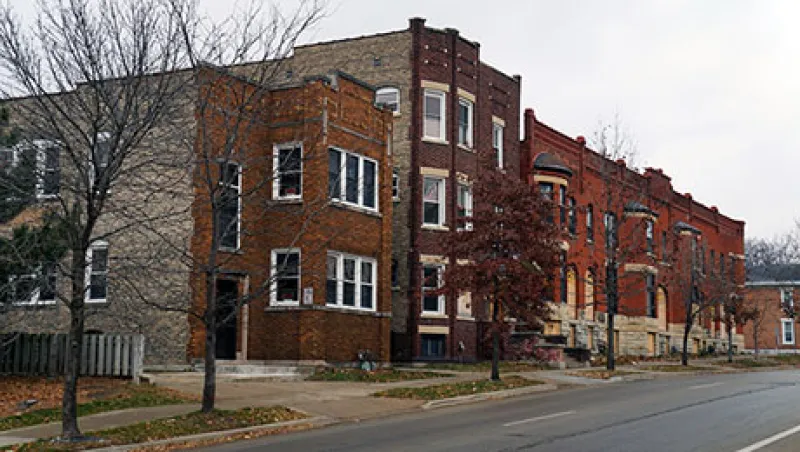The John D. and Catherine T. MacArthur Foundation is best known for its so-called genius grants, generous no-strings-attached fellowships to artists, scientists, activists and other innovators. The foundation’s latest initiative on behalf of urban renewal may be a touch of genius in its own right.
This week the MacArthur Foundation announced a new collaboration that aims to raise $100 million for impact investments in Chicago’s low-income inner city communities. Dubbed Benefit Chicago, the program, launched in conjunction with the Chicago Community Trust and the Calvert Foundation, will offer Calvert's fixed-income securities of between one- and 15-year durations to investors. Unusually for a social sector–lending fund, even retail investors who can invest as little as $20. The money raised will be used to make small loans to and investments in everything from low-income housing development to backing small businesses.
Benefit Chicago is part of the growing impact investing sector, which seeks to use the tools of the capital markets to achieve social and environmental good, as well as to generate financial returns. Investors in the Calvert Foundation notes can expect to make annual returns of anywhere between 1 and 4 percent.
“We at MacArthur have 30 years of experience investing in the social sector,” says Debra Schwartz, head of impact investing at the $6.47 billion Chicago-based foundation. In the past, MacArthur’s social sector investing has come out of the programing, or grant-giving, side of its business. Recently, however, the endowment allocated $500 million of its investment portfolio for impact investments. It will put this money to work through a new, yet to be named, MacArthur-managed investment fund.
Even before that vehicle gets off the ground, the foundation is making its first commitment by seeding Benefit Chicago with $50 million for 15 years, or as long as the venture lasts. It hopes to attract other investors with shorter time horizons via the Calvert note. The result is a structure that enables almost anyone to be an impact investor — individuals can invest in the $20 notes online; otherwise the minimum commitment is $1,000.
“The Calvert Foundation’s goal is to make the practice of impact investing as accessible as possible,” says Margot Kane, who heads up strategic planning and fundraising activities for the $300 million, Bethesda, Maryland–based foundation. Calvert, which raises funds for community investing in the U.S. and abroad, is acting as the issuer of the Chicago notes. Kane says she expects the initiative will raise money “from a really broad network of investors, including local and national banks with a Chicago interest or footprint, all the way to local residents or students or people who are from Chicago” but now live elsewhere and want to give back to their hometown.
The Chicago Community Trust will invest $15 million in 15-year Benefit Chicago notes. MacArthur’s Schwartz credits the trust’s CEO, Terry Mazany, with being instrumental in the formation of the new social impact fund. “Terry Mazany is really committed to finding ways to spark more philanthropy and more impact of all kinds in the region,” she says. The trust has created donor-advised funds with backing from wealthy individuals and other investors and used the money to make charitable gifts to the city, but Mazany was keen to do more. “That is a really important precedent that the Chicago Community Trust is setting for the $70 billion–plus donor-advised market,” says Calvert’s Kane.
The Benefit Chicago model could be replicated in other cities and regions across the country and beyond. Benefit Brooklyn, for example, or Benefit Los Angeles. Perhaps even Benefit Silicon Valley. Like Mazany’s organization, the $6.5 billion Silicon Valley Community Foundation, based in Mountain View, California, is focused on issues of local poverty and operates donor-advised funds. ”We are intrigued with the Benefit Chicago innovation,” says Bert Feuss, who heads up investments for the foundation. “We recognize the potential to replicate and scale by region or impact theme.”
Impact investments in cities is becoming increasingly sophisticated as demand grows from individual investors, foundations and other participants. In March the New York City–based not-for-profit Living Cities announced the launch of its Blended Catalyst Fund, a $31 million debt fund that tests innovative approaches to tackling social problems. The fund has already made a $500,000 loan to Denver Pay for Success for a social finance bond aimed at tackling chronic homelessness in the Colorado city.
“Organizations are creating opportunities for all types of investors — individuals, businesses and institutions — to blend their capital to have an impact locally,” says Living Cities’ director of capital innovation, Eileen Neely. The organization launched the new fund, in which the MacArthur Foundation and other pioneering endowments and financial institutions are investors, to “test innovative approaches to solving urban issues that impact economic growth, like income inequality, job creation and small-business development. By investing in local initiatives, we can have an impact on the ground and achieve better results for low-income people in U.S. cities.”
Like social finance bonds, a structure that is being used to raise capital to tackle issues ranging from prisoner recidivism to deforestation in Indonesia, the note structure that MacArthur has devised for Benefit Chicago could be applied to other issues outside of urban development.
“We need all kinds of capital to address the social needs, the economic and environmental challenges, that we face,” says Schwartz, who was an investment banker at John Nuveen & Co. before moving into the not-for-profit realm (her Twitter handle is @ImpactBanker). The nonprofit sector is never going to be able to address these challenges alone. Increasingly, for-profit investors including pension plans and sovereign wealth funds, along with the foundations and high-net-worth individuals who were early movers in the impact investing field, are looking at these sectors. Now, through Benefit Chicago, like-minded retail investors can also play a part.
Get more on foundations and endowments.
Visit Imogen Rose-Smith’s blog and follow her on Twitter at @imogennyc.






